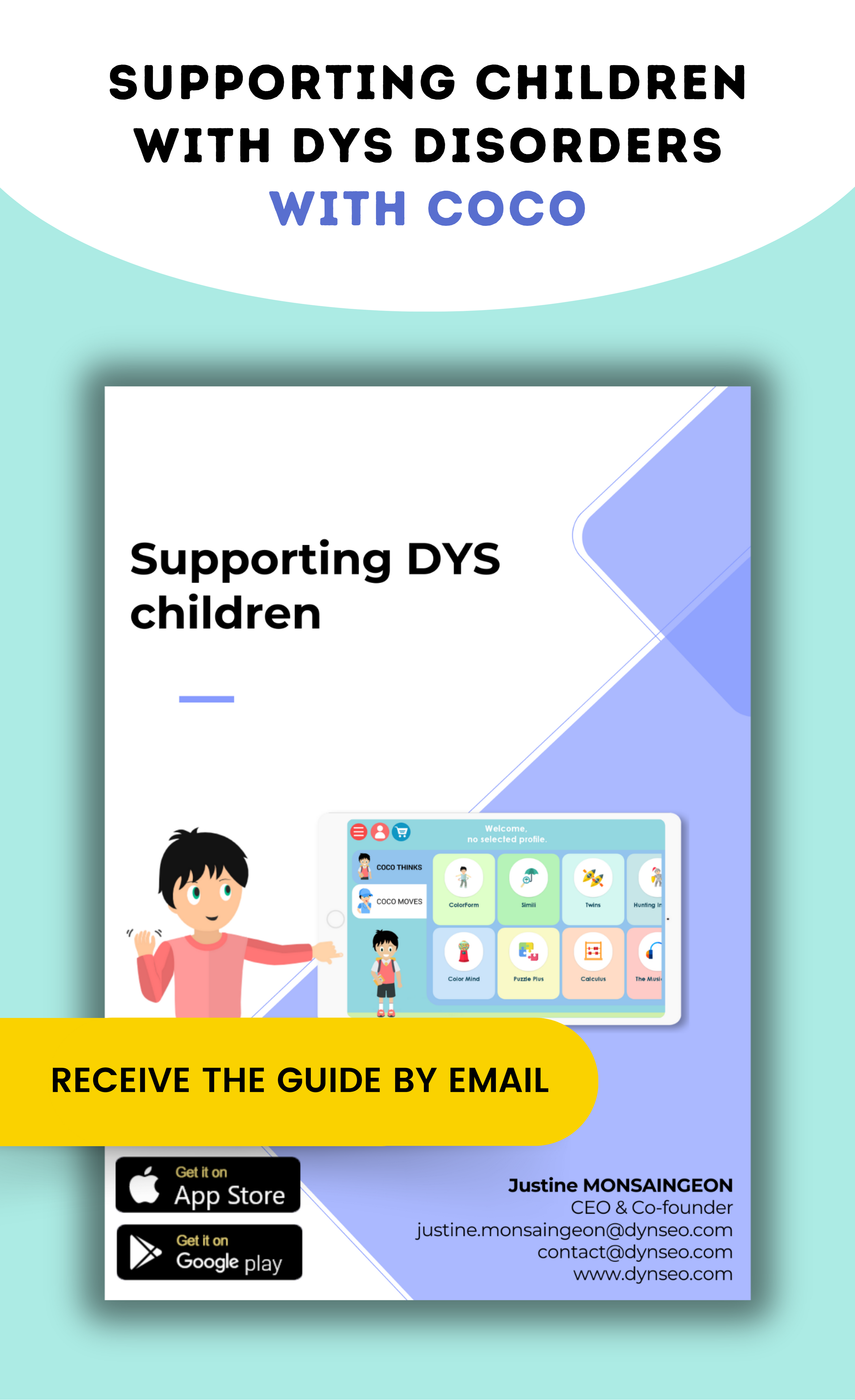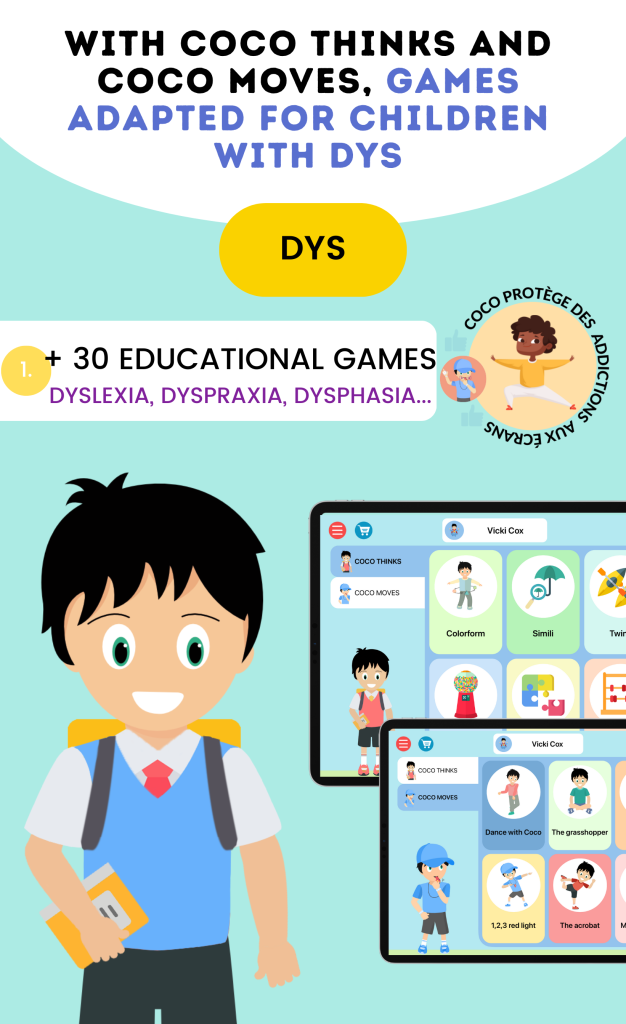DYS disorders, also known as specific learning disorders, are neurological conditions that affect a child’s ability to read, write, understand mathematics, and concentrate. These disorders can make learning difficult and frustrating for affected children. Fortunately, educational apps can be a valuable tool to help children with DYS disorders overcome these challenges and improve their academic skills.
Educational apps offer an interactive approach tailored to the individual needs of children with DYS disorders. They can provide additional support for reading, writing, mathematics, memory, concentration, communication, and socialization. These apps are designed to be engaging and stimulating, allowing children to develop their skills while having fun.
DYS Disorders: What Are They?
DYS disorders are specific learning disorders that affect a child’s ability to process information effectively. There are different types of DYS disorders, including dyslexia (reading difficulties), dysgraphia (writing difficulties), and dyscalculia (mathematics difficulties). These disorders are often hereditary and can be diagnosed from a young age.
Children with DYS disorders may face many challenges in their daily lives. They may struggle to read and understand words, write legibly, solve mathematical problems, and concentrate on a given task. These difficulties can lead to decreased self-esteem and frustration in children, which can negatively impact their motivation and academic success.
How Can Educational Apps Help Children with DYS Disorders?
Educational apps can be a valuable tool to help children with DYS disorders improve their academic skills and overcome their difficulties. Here are some of the benefits of educational apps for these children:
1. Adaptability: Educational apps can be tailored to the individual needs of each child. They can provide additional support for specific skills that the child struggles to develop while allowing them to progress at their own pace.
2. Engagement: Educational apps are designed to be engaging and stimulating. They use interactive elements such as games, quizzes, and rewards to maintain the child’s interest and motivate them to continue learning.
3. Instant Feedback: Educational apps provide instant feedback to the child, allowing them to know immediately whether they answered a question or exercise correctly. This enables them to quickly correct their mistakes and learn from them.
There are many educational apps specifically designed to help children with DYS disorders. For example, the “Easy Reading” app is designed to help dyslexic children improve their reading skills. It uses multisensory reading techniques and interactive exercises to help children recognize sounds and words.
Criteria for Selecting the Best Educational Apps for Children with DYS Disorders
When selecting an educational app for a child with DYS disorders, it is important to consider certain criteria. Here are some factors to consider:
1. Age-appropriate Content: It is important to choose an app that offers age-appropriate content for the child. The content should be suitable and stimulating for the child so that they remain engaged and motivated to learn.
2. Accessibility: Educational apps should be accessible to children with DYS disorders. They should offer features such as the ability to adjust text size, use special fonts for dyslexic children, and provide additional support for specific skills that the child struggles to develop.
3. Ease of Use: Educational apps should be easy to use for children with DYS disorders. They should be intuitive and provide clear instructions so that the child can navigate the app and complete exercises without difficulty.
Educational Apps to Improve Reading Skills for Children with DYS Disorders
Reading is often one of the most challenging skills for children with DYS disorders. Fortunately, there are many educational apps that can help these children improve their reading skills. Here are some examples of apps:
1. “Easy Reading”: This app uses multisensory reading techniques and interactive exercises to help dyslexic children recognize sounds and words. It also offers age-appropriate stories so that the child can practice reading in a fun way.
2. “Phonics Hero”: This app uses games and interactive activities to help children develop their phonics skills. It also provides reading and comprehension exercises so that the child can practice their reading skills progressively.
3. “Read with Phonics”: This app offers a progressive approach to learning to read, starting with individual sounds and progressing to words and sentences. It uses games and interactive activities to make learning to read fun and engaging.
Educational Apps to Improve Writing Skills for Children with DYS Disorders

Writing is often a difficult skill for children with DYS disorders. Fortunately, there are many educational apps that can help these children improve their writing skills. Here are some examples of apps:
1. “LetterSchool”: This app uses interactive games to help children learn to form the letters of the alphabet correctly. It also offers calligraphy and copying exercises so that the child can practice their writing skills progressively.
2. “Writing Wizard”: This app provides personalized writing exercises tailored to the individual needs of each child. It uses games and interactive activities to make learning to write fun and engaging.
3. “Handwriting Without Tears”: This app uses a multisensory approach to help children learn to form the letters of the alphabet. It also offers copying and composition exercises so that the child can practice their writing skills in different contexts.
Educational Apps to Improve Mathematics Understanding for Children with DYS Disorders
Mathematics can be a challenging skill for children with DYS disorders. Fortunately, there are many educational apps that can help these children improve their mathematics skills. Here are some examples of apps:
1. “Mathletics”: This app offers interactive exercises to help children develop their mathematics skills. It also provides fun games and activities to make learning mathematics enjoyable and engaging.
2. “Prodigy”: This app uses role-playing and game elements to help children practice their mathematics skills. It also offers exercises tailored to the child’s level so that they can progress at their own pace.
3. “MathTango”: This app offers age-appropriate mathematics exercises so that the child can practice their mathematics skills progressively. It also uses games and interactive activities to make learning mathematics fun and engaging.
Educational Apps to Improve Memory and Concentration for Children with DYS Disorders
Children with DYS disorders may struggle to concentrate and memorize information. Fortunately, there are many educational apps that can help them improve their memory and concentration. Here are some examples of apps:
1. “Elevate”: This app offers memory and concentration exercises tailored to the child’s age. It also uses games and interactive activities to make learning fun and engaging.
2. “Lumosity”: This app provides targeted exercises to help children develop their memory and concentration. It also uses games and interactive activities to make learning enjoyable and stimulating.
3. “CogniFit”: This app offers cognitive stimulation exercises to help children improve their memory and concentration. It also uses games and interactive activities to make learning fun and engaging.
Educational Apps to Improve Communication and Socialization for Children with DYS Disorders
Children with DYS disorders may have difficulty communicating and socializing with others. Fortunately, there are many educational apps that can help them improve their communication and socialization skills. Here are some examples of apps:
1. “Social Stories”: This app offers social stories to help children understand social interactions and develop their communication skills. It also uses games and interactive activities to make learning fun and engaging.
2. “ConversationBuilder”: This app provides conversation exercises to help children develop their communication skills. It also uses games and interactive activities to make learning enjoyable and stimulating.
3. “Autismate”: This app offers visual communication tools to help children communicate their needs and emotions. It also uses games and interactive activities to make learning fun and engaging.
Educational Apps to Help Parents and Teachers Better Understand DYS Disorders
It is important for parents and teachers to understand DYS disorders in order to effectively support children who are affected. Fortunately, there are many educational apps that can help parents and teachers better understand these disorders. Here are some examples of apps:
1. “Dyslexia Quest”: This app provides information about dyslexia, as well as tips and strategies to support dyslexic children. It also uses games and interactive activities to make learning fun and engaging.
2. “Dysgraphia Help”: This app provides information about dysgraphia, as well as tips and strategies to support dysgraphic children. It also uses games and interactive activities to make learning enjoyable and stimulating.
3. “Dyscalculia Toolkit”: This app provides information about dyscalculia, as well as tips and strategies to support dyscalculic children. It also uses games and interactive activities to make learning fun and engaging.
The Advantages and Limitations of Educational Apps for Children with DYS Disorders
Educational apps can be a valuable tool to help children with DYS disorders improve their academic skills. They offer an interactive approach tailored to the individual needs of each child, allowing them to progress at their own pace. Moreover, these apps are designed to be engaging and stimulating, enabling children to develop their skills while having fun.
However, it is important to note that educational apps should not be used as a substitute for other forms of learning and teaching. They can be a complementary and interactive tool to reinforce knowledge acquired in class, but they cannot replace human interaction and teaching provided by teachers. Educational apps can be useful for reviewing concepts, practicing exercises, or deepening specific topics, but they cannot provide the overall experience and in-depth understanding that can be obtained through classroom teaching. Therefore, it is essential to find a balance between using educational apps and other traditional learning methods to ensure a comprehensive and quality education.




